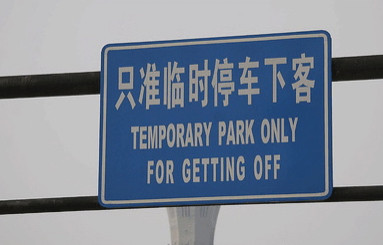'Chinglish' Signs To Be Wiped Out: Ban On Foreign Names Soon To Go In Effect

Bad news for fans of China’s often hilarious photos of "Chinglish" signs -- street signs or directions that have been poorly translated -- they may soon be wiped out. After one city had announced plans to enlist the public to track down signs of incorrect English usage, an entire province is planning on integrating a new ban on using foreign names for buildings, streets and other places.
Late last month, the southern city of Shenzhen launched a two-month campaign intended to remove all Chinglish signs with the help of local English-literate residents. The Shenzhen Daily reported that people were being encouraged to take pictures of incorrect English usage or grammar issues on public signs and use social media to report them to the appropriate people. People who sent in photos were asked to include the location of the signs and detail the mistakes made, at which point the city’s foreign affairs office would look through submissions.
The city even offered small incentives to individuals who helped crack down on the signs. “People will be awarded based on how many correct submissions they send,” Huang Zhijun, director of the International Language Environment Department, said in a press conference. Such rewards included small tokens of appreciation like language books and training.
Now, an entire province is cracking down on English signage. Centrally located Henan has announced a new ban, effective Oct. 15, on the use of foreign person and place names in the Chinese-language names of buildings, streets and other locales. According to the Global Times, the new regulation was introduced as a remedy for the “chaotic situation of place naming,” where buildings or developments “deploy vulgar nomenclature,” the publication said.
The fate of some well-known places like “Zhengzhou Manhattan,” a shopping mall, and “Venice Water World,” a hotel in the city of Zhengzhou in Henan, is unknown, as it isn’t clear how quickly name changes need to occur.
According to the report, organizations or individuals who refuse to abide by the new approval system, which will be made by local administrative departments, will face fines of 200 to 1,000 yuan, or roughly $33 to $163. Not everyone thinks the current naming is as “chaotic” as the local government may believe, and instead, the trend can be considered a sign of social change.
“The characteristics of an era can be seen from place names, and using foreign names hints that Chinese people are now also leading a rich life,” Li Xiangping, a sociology professor at the East China Normal University, told the Henan local paper.
© Copyright IBTimes 2024. All rights reserved.





















